Results
-
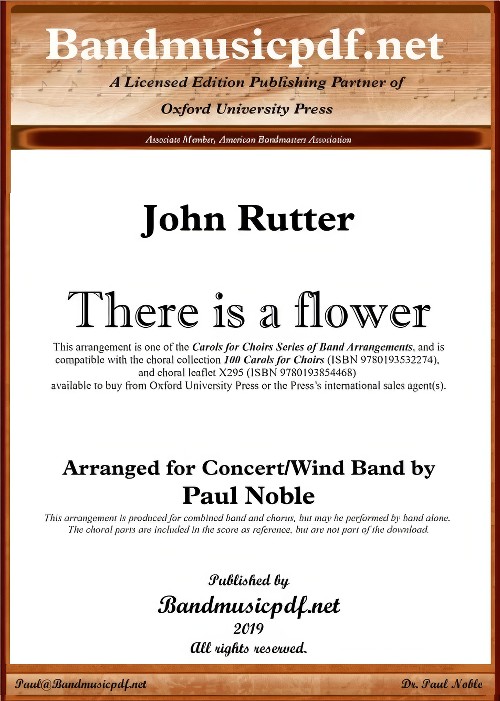 £75.00
£75.00There is a Flower (Concert Band with Optional Choir - Score and Parts) - Rutter, John - Noble, Paul
Named 'the world's greatest living composer and conductor of choral music' by US television station NBC, there's no denying Rutter's skill at seducing both choirs and audiences alike with his rich harmonies and folk-like melodies that often have the air of being written centuries ago. There is a Flower is one such piece - a simple, spare treble melody starts the work and is gradually enriched with delicious choral textures. This arrangement represents one in the Series of Band Arrangements compatible with David Willcocks' Carols for Choirs.
Estimated dispatch 7-14 working days
-
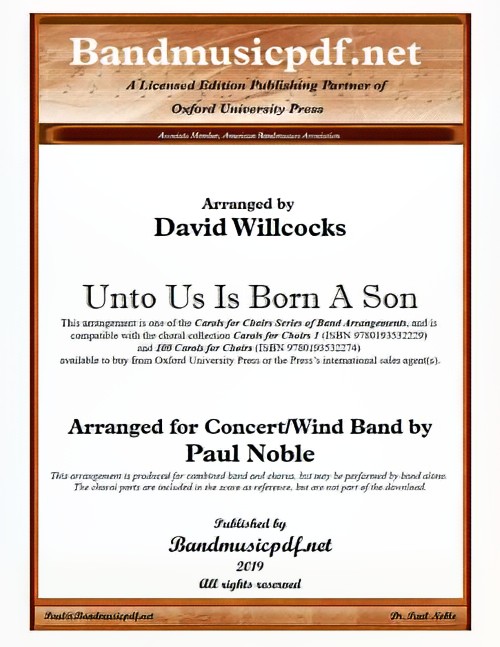 £75.00
£75.00Unto Us is Born a Son (Concert Band with Optional Choir - Score and Parts) - Noble & Willcocks
Unto Us is Born a Son is a medieval Christmas carol found in a number of manuscript sources - the 14th-century German Moosburg Gradual and a 15th-century Trier manuscript. The Moosburg Gradual itself contained a number of melodies derived from the 12 and 13th century organum repertories of Notre Dame de Paris and the Abbey of Saint Martial, Limoges, suggesting that its antiquity may be much greater. The carol became popular as a processional hymn following a translation by George Ratcliffe Woodward (1859-1934) first published in 1902. This arrangement represents one in the Series of Band Arrangements compatible with David Willcocks' Carols for Choirs.
Estimated dispatch 7-14 working days
-
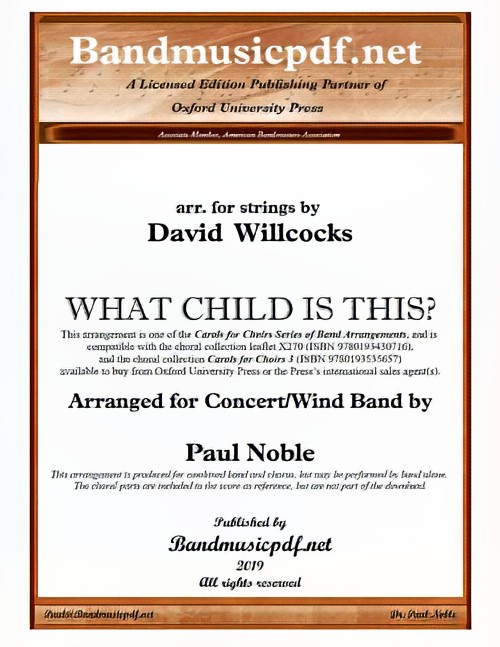 £75.00
£75.00What Child is This? (Concert Band with Optional Choir - Score and Parts) - Noble & Willcocks
What Child Is This? is a Christmas carol whose lyrics were written by William Chatterton Dix, in 1865. At the time of composing the carol, Dix worked as an insurance company manager and had been struck by a severe illness. While recovering, he underwent a spiritual renewal that led him to write several hymns, including lyrics to this carol that was subsequently set to the tune of Greensleeves, a traditional English folk song. Although it was written in Great Britain, the carol is more popular in the United States than in its country of origin today. The context of the carol centres around the Adoration of the Shepherds, who visited Jesus during his Nativity. The questions posed in the lyrics reflect what the shepherds were possibly pondering to themselves when they encountered him, with the rest of the carol providing a response to their questions. This arrangement represents one in the Series of Band Arrangements compatible with David Willcocks' Carols for Choirs.
Estimated dispatch 7-14 working days
-
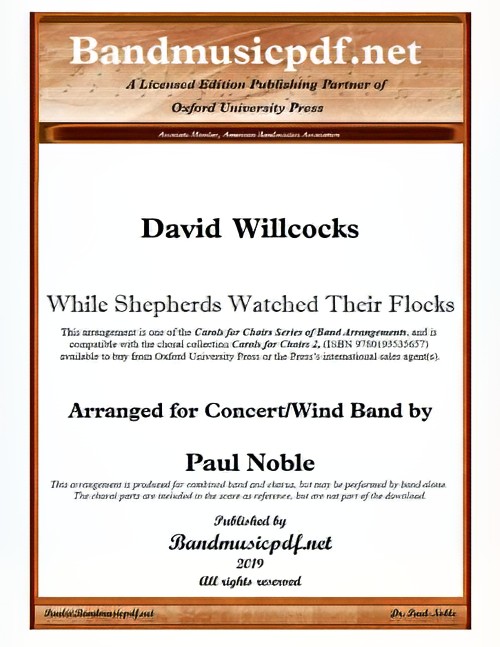 £75.00
£75.00While Shepherds Watched Their Flocks (Concert Band with Optional Choir - Score and Parts) - Willcocks, David - Noble, Paul
While shepherds watched their flocks is a Christmas carol describing the Annunciation to the Shepherds, with words attributed to Irish hymnist, lyricist and England's Poet Laureate Nahum Tate. The exact date of Tate's composition is not known, but the words appeared in Tate and Nicholas Brady's 1700 supplement to their New Version of the Psalms of David of 1696. It was the only Christmas hymn authorised to be sung by the Anglican Church; before 1700 only the Psalms of David were permitted to be sung. In the United Kingdom and Commonwealth countries, the standard hymn tune of While shepherds watched is Winchester Old (initially simply Winchester), originally published in Este's psalter The Whole Book of Psalmes from 1592. This arrangement represents one in the Series of Band Arrangements compatible with David Willcocks' Carols for Choirs.
Estimated dispatch 7-14 working days
-
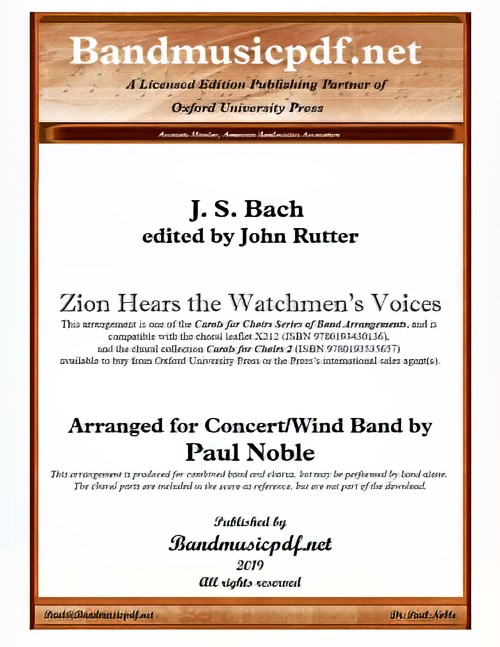 £75.00
£75.00Zion Hears the Watchmen's Voices (Concert Band with Optional Choir - Score and Parts) - Bach, Johann Sebastian - Noble & Rutter
Zion Hears the Watchmen Singing (Zion hrt die Wchter singen) is the fourth of seven movements of Bach's cantata Wachet auf, ruft uns die Stimme ('Awake, calls the voice to us'), BWV 140, also known as Sleepers Wake. It is regarded as one of his most mature and popular sacred cantatas. It is written in the style of a chorale prelude, with the phrases of the chorale, sung as a cantus firmus by the tenors (or by the tenor soloist), entering intermittently against a famously lyrical melody played in this arrangement in unison principally by the woodwinds. Bach composed the chorale cantata in Leipzig for the 27th Sunday after Trinity and first performed it on 25 November 1731. This arrangement represents one in the Series of Band Arrangements compatible with David Willcocks' Carols for Choirs.
Estimated dispatch 7-14 working days
-
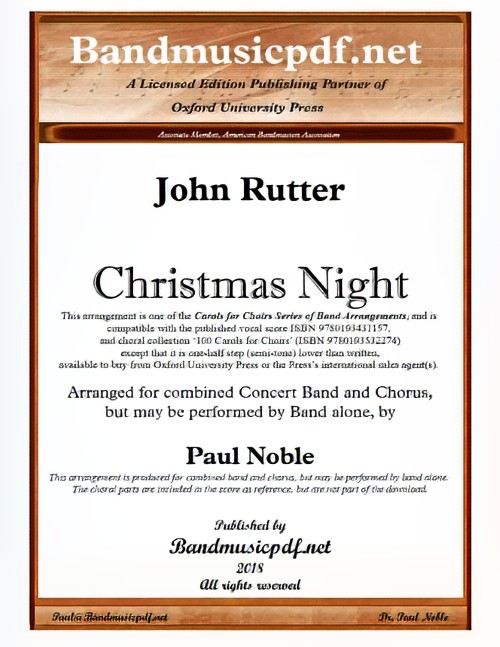 £75.00
£75.00Christmas Night (Concert Band with Optional Choir - Score and Parts) - Rutter, John - Noble, Paul
Christmas Night is John Rutter's setting of a traditional French Carol, with words by John Rutter. It became the theme of one of his Christmas albums, focusing on the central event of the Christmas story, the birth at Bethlehem, and on the characters in that story: the angels, the shepherds, the wise men, and the mother with her child. This arrangement is written for combined Concert Band and Chorus, but may be performed by Band alone. The arrangement is technically very easy, and is a showpiece of the colours and textures of the families of band instruments.
Estimated dispatch 7-14 working days
-
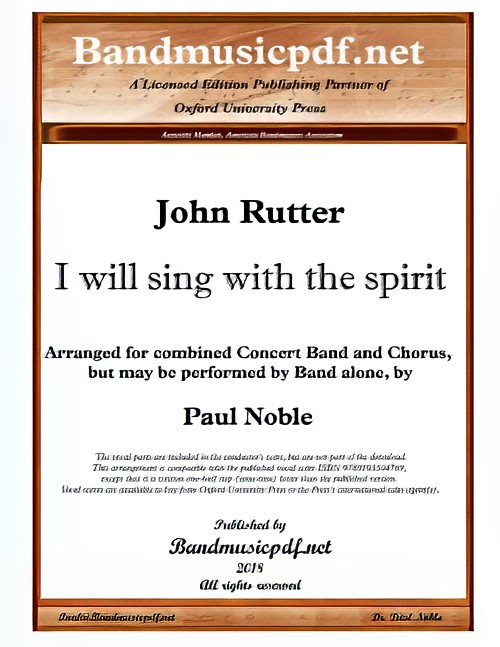 £75.00
£75.00I Will Sing with the Spirit (Concert Band with Optional Choir - Score and Parts) - Rutter, John - Noble, Paul
This well-known piece by John Rutter is set in a subtle Latin mode, to which the arranger has enhanced by adding castanets, maracas, claves, and congas. The arrangement is written for combined band and chorus, but may be performed by band alone, featuring a variety of instruments carrying the melody and its harmonies. It is written one-half step (one semi-tone) lower than the original presentation to better accommodate band instruments.
Estimated dispatch 7-14 working days
-
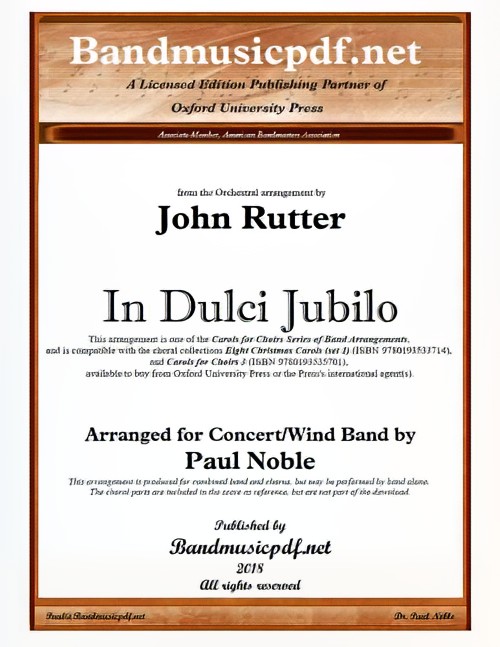 £75.00
£75.00In Dulci Jubilo (Concert Band with Optional Choir - Score and Parts) - Noble & Rutter
One night in 1328, the German mystic and Dominican monk Henrich Suso (or Seuse) had a vision in which he joined angels dancing as the angels sang to him Nun singet und seid froh or In Dulci Jubilo. In Suso's biography (or perhaps autobiography), it was written: Now this same angel came up to the Servant [Suso] brightly, and said that God had sent him down to him, to bring him heavenly joys amid his sufferings; adding that he must cast off all his sorrows from his mind and bear them company, and that he must also dance with them in heavenly fashion. Then they drew the Servant by the hand into the dance, and the youth began a joyous song about the infant Jesus, which runs thus: 'In dulci jubilo', etc. In Dulci Jubilo is among the oldest and most famous of the macaronic songs, one which combines Latin and a vernacular language such as English or German. Five hundred years later, this carol became the inspiration for the 1853 English paraphrase by John Mason Neale, Good Christian Men, Rejoice. Perhaps the earliest English version appeared c.1540. That popularity has endured for nearly 700 years. It's the rare contemporary collection of Christmas carols that doesn't contain a carol based on this ancient jewel.
Estimated dispatch 7-14 working days
-
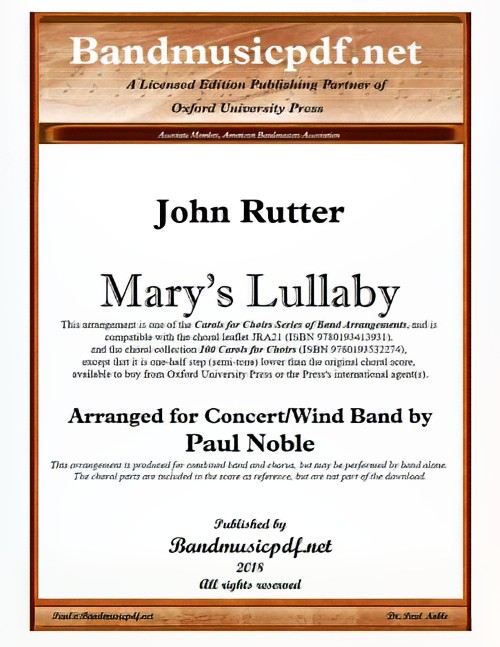 £75.00
£75.00Mary's Lullaby (Concert Band with Optional Choir - Score and Parts) - Rutter, John - Noble, Paul
John Rutter endeavored over many Christmases to reinvigorate the genre of the Christmas carol, not necessarily by replacing traditional images and tunes with new creations, but by retranslating them in his own creative manner. His 1979 setting of an original composition, Mary's Lullaby, restates the images of manger, angels, shepherds, and wise men. This arrangement for combined Concert Band and Chorus brings this music to a new and wider audience. The beauty of the music itself can be experienced without words or chorus with the option of performing this by Concert Band alone.
Estimated dispatch 7-14 working days
-
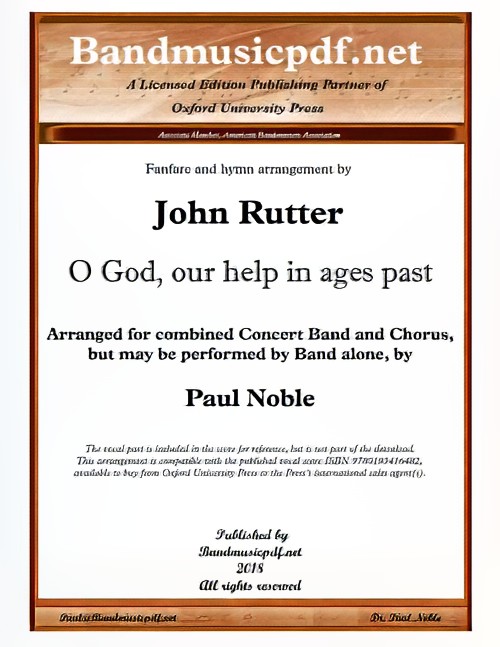 £75.00
£75.00O God, Our Help in Ages Past (Concert Band with Optional Choir - Score and Parts) - Rutter, John - Noble, Paul
Considered one of the finest paraphrases written by Isaac Watts, O God, Our Help in Ages Past expresses a strong note of assurance, promise, and hope as recorded in the first part of Psalm 90. This Festive fanfare and hymn arrangement by John Rutter, adapted by Paul Noble, makes a powerful piece for combined Concert/Wind Band and Chorus, one that is a very accessible and a worthy addition to the repertoire of the Concert Band.
Estimated dispatch 7-14 working days
